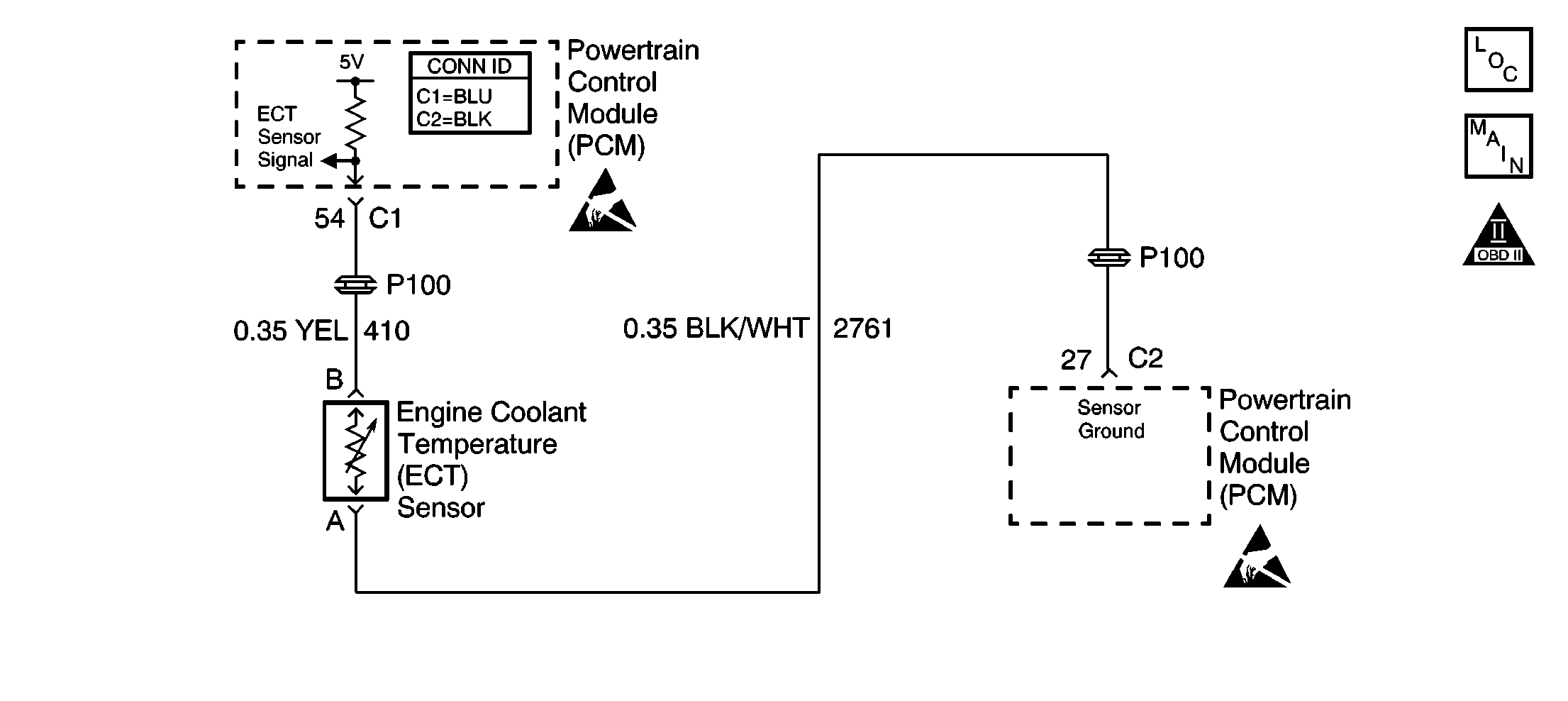
Circuit Description
The purpose of the engine cooling system is to maintain an efficient engine coolant temperature level during all engine operating conditions. This is accomplished by using a thermostat to regulate the flow of engine coolant from the engine to the radiator. The thermostat allows the engine coolant to warm up faster by not allowing the engine coolant to flow through the radiator until the engine coolant has reached the thermostat regulating temperature. An engine coolant temperature (ECT) sensor monitors the temperature of the engine coolant. The Powertrain Control Module(PCM) uses the ECT sensor input for the following conditions:
| • | The engine control |
| • | The enabling criteria for some diagnostics |
The air flow coming into the engine is accumulated and is used to determine if the engine has been driven within the conditions that would allow the engine coolant to heat to the normal thermostat regulating temperature. The diagnostics that use the engine coolant temperature for enabling criteria may not run when expected if the following conditions exists:
| • | The engine coolant temperature does not increase normally. |
| • | The engine coolant does not reach the thermostat regulating temperature. |
Conditions For Running The DTC
| • | The following DTCs are not set: P0105, P0107, P0108, P0112, P0113, P0117, P0118, P0122, P0123, P0130, P0131, P0132, P0171, P0172, P0201, P0202, P0203, P0204, P0300, P0325, P0336, P0420, P0440, P0442, P0446, P0452, P0453, P0480, P0502, P0503, P0506 or P1441. |
| • | The engine has been running for more than 30 seconds and less than 20 minutes. |
| • | The minimum intake air temperature (IAT) is more than -7°C (27°F). |
| • | The ECT at start up is less than 65°C (149°F). |
Conditions For Setting The DTC
| • | The average air flow is more than 15 g/sec (automatic transmission). |
| • | The average air flow is more than 22 g/sec (manual transmission). |
| • | The vehicle has traveled more than 1.5 miles over 25 mph. |
| • | Enough air flow has entered the engine and the ECT has not risen to 70°C (158°F) for 30 seconds. |
Action Taken When the DTC Sets
| • | The Malfunction Indicator Lamp (MIL) will illuminate after 2 consecutive ignition cycles in which the diagnostic runs with the malfunction present. |
| • | The PCM will record the operating conditions at the time that the diagnostic fails. This information will store in the Freeze Frame and Failure Records buffers. |
| • | A history DTC stores. |
| • | The coolant fan turns on. |
Conditions for Clearing the MIL/DTC
| • | The MIL will turn off after 3 consecutive ignition cycles in which the diagnostic runs without a fault. |
| • | A history DTC will clear after 40 consecutive warm up cycles without a fault. |
| • | Use a scan tool to clear the DTCs. |
Diagnostic Aids
A skewed ECT sensor will cause this DTC code to set.
An intermittent may be caused by the following conditions:
| • | A poor electrical connection |
| • | A rubbed-through wire insulation |
| • | A broken wire inside the insulation |
| • | Inspect for a poor electrical connection or a damaged PCM harness. Inspect the ECT sensor signal circuit and the ground circuit terminals for the following conditions: |
| - | Any incorrect mating |
| - | Any broken locks |
| - | Any incorrectly formed connectors |
| - | Damaged terminals |
| - | A poor terminal-to-wire connection |
| - | A damaged harness |
| • | Perform an intermittent test. If the electrical connections and the harness are OK, monitor a DMM connected between ECT sensor signal circuit and the ground circuit while moving the related electrical connectors and the wiring harness. If a malfunction is induced, the resistance reading will change. This may help to isolate the location of the malfunction. |
| • | Use the Temperature vs Resistance table in order to evaluate the possibility of a skewed sensor. Refer to Temperature Versus Resistance . |
Test Description
The numbers below refers to the step numbers on the diagnostic table.
Step | Action | Values | Yes | No |
|---|---|---|---|---|
1 | Did you perform the Powertrain On-Board Diagnostic (OBD) System Check? | -- | Go to Step 2 | |
2 | Are any other DTCs set? | -- | Go to Step 3 | |
3 | Use a scan tool in order to determine if P0128 set this ignition. Did P0128 set this ignition? | -- | Go to Step 6 | Go to Step 4 |
4 |
Are the readings within the specified value of each other? | 5° | Go to Step 5 | Go to Step 6 |
5 | Operate the vehicle within the Conditions for Running the DTC as specified in the supporting text. Does the DTC reset? | Go to Step 6 | Go to Diagnostic Aids | |
Does the ECT sensor accurately measure the actual engine coolant temperature? | -- | Go to Engine Fails To Reach Normal Operating Temperature in Engine Cooling | Go to Step 7 | |
7 |
Did you complete the replacement? | -- | Go to Step 8 | -- |
8 |
Does the DTC reset? | Go to Step 2 | System OK |
